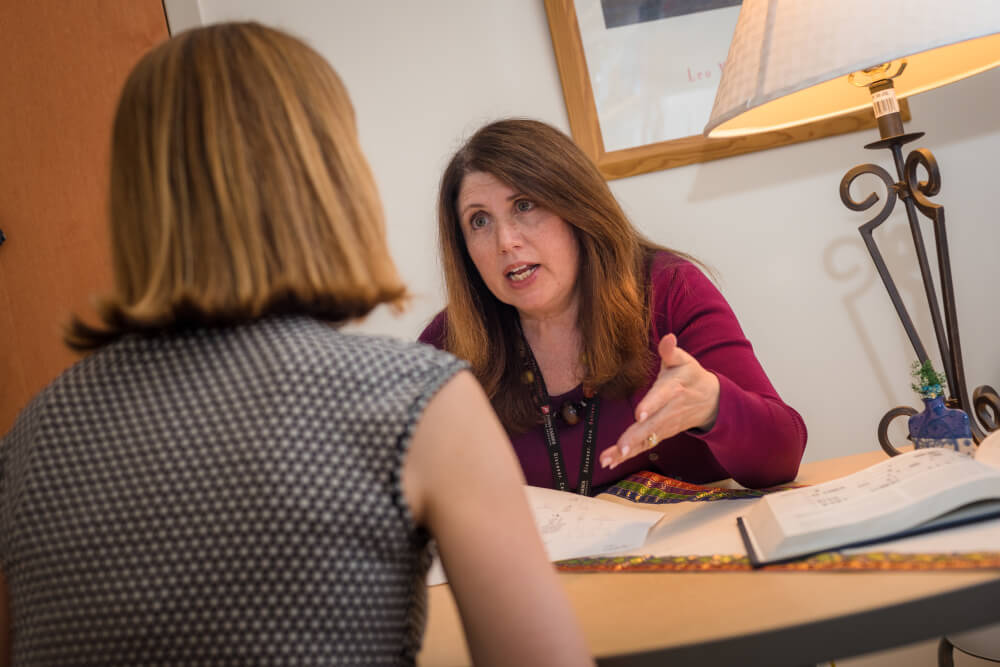The vast majority of cancers do not have a strong hereditary link, but for people who have been diagnosed with cancer or have a significant family history of the disease, genetic testing can often shed light on the cause of the disease or an individual’s likelihood of developing it or other cancers. This information can be critical in determining how the disease is treated or how at-risk people can lower their risk.
Here, Jill Stopfer, MS, LGC, associate director of Genetic Counseling at Dana-Farber’s Center for Cancer Genetics and Prevention, answers your questions about genetic testing to assess cancer risk.
Is genetic testing for inherited risk important if I already have or had cancer?
For people with a personal history of cancer — those who have been diagnosed with the disease either recently or years earlier — genetic testing can help doctors better understand the biology of the disease and decide how best to treat it.
For example, a person who develops breast cancer may have an inherited predisposition to the disease. If testing reveals that they carry a mutation in a cancer-linked gene such as BRCA1 or BRCA2, their medical team might recommend different treatment options or future screening and preventive measures than if they did not carry the mutations.
In addition, if someone has an inherited risk, other family members might also have it and might want to be tested. Those who do test positive can then explore potential preventive measures or decide to begin screening for cancer early.
Dana-Farber Cancer Genetics and Prevention tests for a wide range of syndromes and genes, including but not limited to:
- Hereditary Breast and/or Ovarian Cancer genes
- Li-Fraumeni Syndrome
- Lynch Syndrome or Hereditary Nonpolyposis Colorectal Cancer genes
- Familial Adenomatous Polyposis (FAP) and Attenuated Familial Adenomatous Polyposis genes
- Familial Pancreatic Cancer genes
Explore a comprehensive list here.

When is genetic testing for inherited risk recommended if I don’t have a personal history of cancer?
Genetic testing may be recommended for people who have a family history of the disease that suggests an inherited susceptibility. Features of a significant family history include:
- A family member has tested positive for an inherited mutation.
- Multiple people in the family have the same form of cancer. For example, if three close relations all have colon cancer, that suggests a possible link.
- One or more people in the family have developed cancer at an earlier age than the norm for that type of cancer.
- One or more family members have experienced multiple different types of cancer, suggesting some sort of vulnerability.
This list is not all-inclusive. People from smaller families or who have limited family history may also harbor risk genes. Dana-Farber genetic counselors can help you determine if testing is right for you.
Learn more: What to expect from a genetic counseling
What do I do if I test positive for an inherited cancer mutation?
If you test positive for an inherited cancer mutation, a genetic counselor will be able to help you understand the risk, which might be a small increase or a large one depending on your individual genetics.
A variety of actions may be in order:
- Start screening early. Early screening is widely available for breast cancer and colon cancer. Screening methods for those at a high risk of prostate cancer are being developed. Screening methods are in the early stages of evaluation for pancreatic cancer.
- Consider preventive measures. Prevention can include a focus on wellness, such as nutrition and exercise, but in some cases, medical or surgical interventions might be recommended.
- Let close relatives know of the results. Close relatives include siblings, children, cousins, nephews, and nieces. They may wish to undergo genetic testing themselves to learn if they carry the mutation.
Learn more: How to Talk to Your Family about Genetic Cancer Risk
How do I know if a preventive measure is right for me?
Talking with a genetic counselor can help you decide on a course of action. The decision to take preventive steps, such as special screening, surgery, or medication, is different for everyone and may be influenced by the extent of the risk associated with a particular mutation.
For example, an individual may respond differently to a mutation that raises the risk of colon cancer by 80 percent than to a mutation that raises it by only 20 percent.
Is genetic testing expensive?
Genetic counseling and genetic testing are often covered by health insurance. Genetic counselors can provide patients with information about getting genetic testing covered.
